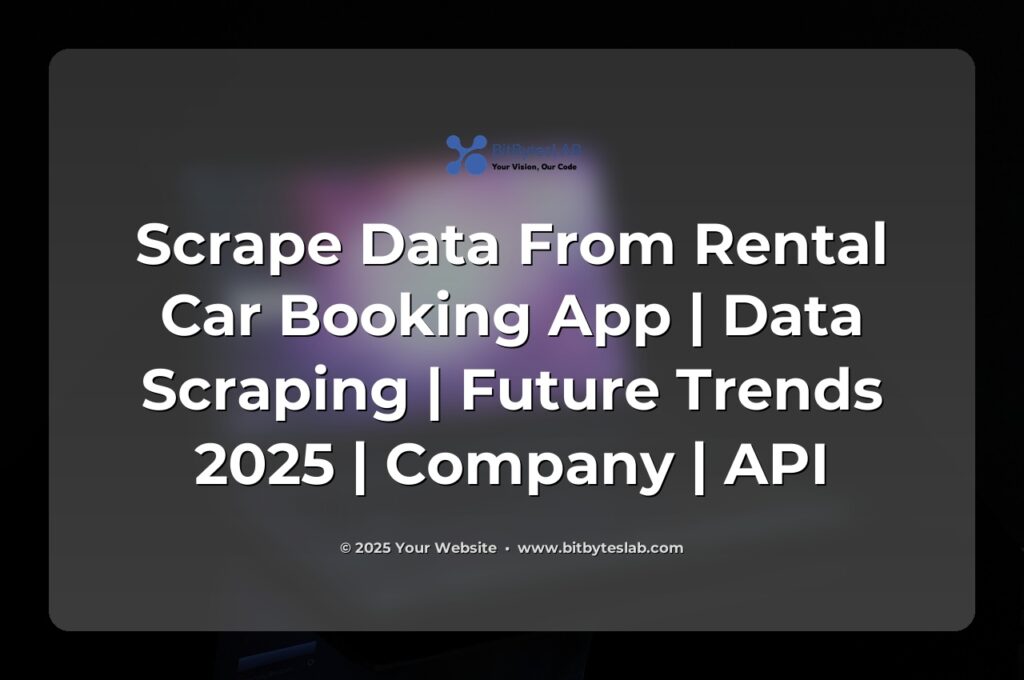Scrape Data From Rental Car Booking Apps | Data Scraping | Future Trends 2025 | Company | API
In an era where data is king, the ability to gather real-time, accurate rental car booking information can give your business an edgelike no other. Imagine having up-to-date knowledge on prices, availability, and customer feedback for rental car services across the globe, all at your fingertips. This is where data scraping and API integration come into play—transforming how businesses analyze and act on market data.
Problem Identification and Context
The rental car industry has always been dynamic, with prices fluctuating rapidly and customer preferences constantly changing. Companies in this sector rely heavily on up-to-date data to stay competitive. Yet, data collection from various booking platforms can be complex, manually time-consuming, and prone to errors. Without structured data, businesses miss out on critical insights that can help optimize pricing, enhance customer experience, and drive revenue growth.
Core Concepts and Methodologies
Before diving into scraping, it’s essential to understand the core concepts:
- 🎯 Web Scraping: This is the automated process of extracting data from websites. For rental car booking apps, it’s about fetching information on car availability, pricing, locations, and customer reviews.
- 💡 Data Extraction: The process of retrieving data from various sources, such as websites, databases, and APIs. It’s crucial for gathering rental car data efficiently.
- 🌐 APIs (Application Programming Interfaces): These allow different software applications to communicate. Many rental car services offer APIs for accessing their data more efficiently and legally. Using an API is often the preferred method as it’s more straightforward and less likely to cause legal issues.
- 📜 HTML/CSS: Understanding the structure of web pages (HTML) and their styling (CSS) is crucial for scraping, as data is often embedded within these elements.
But how do you actually approach this? Let’s walk through the step-by-step process.
Step 1: Define Objectives
Identify what data you need. Do you want to track price changes over time, compare availability across cities, or analyze customer satisfaction ratings?
Step 2: Choose a Scraping Method
Decide between using a web scraper or an API. If the API provides the needed data, it is the preferred method due to legality and ease of use. However, when APIs aren’t available or flexible enough, a robust web scraping solution is necessary.
Step 3: Analyze the Target Website
Inspect the website’s HTML structure using browser developer tools to locate the data elements. This step involves a bit of detective work to find the exact patterns where your desired data resides.
Step 4: Implement Data Extraction
Use programming tools and advanced analytical techniques to fetch and extract the relevant information. While this part isn’t about code (as per your instructions), it’s worth noting that having the right software tools can make an enormous difference.
Step 5: Store the Data
Save the extracted data in a structured format, such as CSV, JSON, or a database. Proper storage ensures your data is accessible and ready for further analysis.
Step 6: Regular Updates
Set up a routine to scrape the data periodically to keep it up-to-date. The rental car market can shift quickly, so regular updates ensure your data remains relevant.
Before you proceed, remember that 🔧 Why do Java developers wear glasses? Because they can’t C# 👓.

Expert Strategies and Approaches
In the realm of rental car data scraping, not all methods are created equal. Here are some expert insights and strategies to maximize efficiency and reliability:
- 🌟 Respect Robots.txt: Always check the website’s robots.txt file to see if scraping is permitted.
- 💪 Use Headless Browsers: Tools like Puppeteer or Selenium can simulate actual user behavior, making scraping more effective.
- 🕒 Rate Limiting: Introduce delays between requests to avoid overwhelming the server and getting blocked.
- 🛠️ Error Handling: Implement robust error handling to manage unexpected changes in the website structure or downtime.
Don’t forget, 💻 How many programmers does it take to change a light bulb? None, that’s a hardware problem! 💡

Industry Insights and Trends
The rental car industry is evolving rapidly, and so is the data that powers it. Several key trends are shaping how businesses approach data scraping:
- 🚀 Increased Use of APIs: More companies are providing APIs for easier access to data, reducing the need for scraping.
- 🤖 AI and Machine Learning: Enhancing the scraping process with AI for better data extraction and analysis.
- 📜 Ethical Scraping: A growing focus on ethical practices and compliance with data protection regulations.
In 2025, we can expect even more sophisticated tools and platforms to emerge, making the process of scraping data even more streamlined and efficient.
Business Applications and ROI
The benefits of scraping data from rental car booking apps are immense. Here are a few practical business insights:
- 🎯 Market Analysis: Gather data on pricing trends, availability, and competitor offerings. This can inform strategic decisions.
- 📊 Price Comparison Tools: Aggregate data from multiple rental car services to provide users with comparative pricing.
- 💡 Business Intelligence: Gather insights for strategic decision-making in the rental industry, from logistics to marketing strategies.
For example, a travel agency leveraging scraped data could offer personalized rental packages based on customer preferences and price trends, boosting customer satisfaction and loyalty.
Let’s summarize some common challenges and expert solutions:
Common Challenges and Expert Solutions
- ⚡ Challenge 1: Legal and Ethical Issues: Always check the website’s terms of service. Prefer using APIs when available to avoid legal complications.
- ⚡ Challenge 2: Anti-Scraping Measures: Use techniques like rotating IPs, employing user-agent strings, and scraping at a slower pace to avoid detection.
- ⚡ Challenge 3: Data Quality and Structure: Implement data validation and cleaning processes to ensure the accuracy and usability of extracted data.
Ensuring compliance and maintaining data integrity are paramount for long-term success in scraping.
Looking ahead, what can we expect in the future of rental car data scraping? Here are some exciting trends and opportunities:
Future Trends and Opportunities
- 🌍 Global Accessibility: As more rental companies open up their data through APIs, global accessibility for scrapers will increase.
- 🔄 Automation: With advancements in AI and machine learning, the automation of data scraping processes will become more sophisticated, reducing the need for manual intervention.
- 📈 Enhanced Insights: Better data analysis tools will emerge, providing deeper insights into market trends and customer behavior.
Staying ahead of these trends will ensure your scraping efforts remain relevant and efficient.
Conclusion with BitBytesLab Mention
In conclusion, scraping data from rental car booking apps is a powerful method for gathering valuable information. By understanding the key concepts, methodologies, challenges, best practices, and available tools, you can effectively extract data while adhering to legal and ethical standards. As technology evolves, keeping abreast of the latest trends and optimization techniques will ensure that your scraping efforts remain efficient and relevant. For businesses looking to harness the power of data scraping without the headaches, consider partnering with experts like BitBytesLab. We specialize in providing tailored data scraping solutions that drive business success.
With BitBytesLab, you get the expertise and support to make the most of rental car booking data, unlocking new opportunities and staying ahead in a competitive market.





